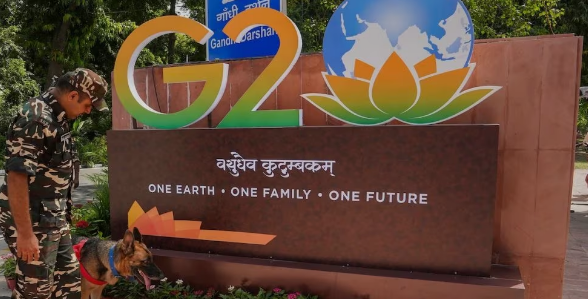The author attempts to discuss the significance of India’s presidency in the G20 summit through this article and highlights the potential for increased international collaboration in education and research. The article explores various schemes aimed at enhancing overseas education for Indian students, such as RDI capacity building and academic mobility programs. The article also emphasizes the promising opportunities for students to pursue international education and career prospects during this transformative period.
Introduction
While Delhi has been adorned with murals, fountains, and plants to welcome delegates from more than 20 nations for the G20 Summit, everyone is looking forward to the prospects the summit would open up for India. The G20 Leaders’ Summit will be held at the newly inaugurated Bharat Mandapam, Pragati Maidan on September 9-10 in the national capital, for which security has been tightened.
The G20 was founded in 1999 after the Asian financial crisis as a meeting for Finance Ministers and Central Bank Governors to address global economic and financial concerns. It has now been elevated to the level of Heads of State and is known as the “premier forum for international economic cooperation.” Argentina, Australia, Brazil, Canada, China, France, Germany, India, Indonesia, Italy, Japan, Republic of Korea, Mexico, Russia, Saudi Arabia, Southlant Africa, Turkey, United Kingdom, and the United States comprise the Group of 20 (G20), which accounts for 80% of global GDP, 75% of international trade, and 60% of global population.
With India presiding over the G-20 conference this year, the global economic and political dynamics would undergo a fundamental upheaval. Furthermore, as reflected in the Study Abroad Outlook Report released by Leap-Ipsos in 2022, India is experiencing an expanding aspiration for overseas education, with over two million Indian students spending a total of US$100 billion on their education by 2025.
Implications Of Indian Presidency

G20 countries not only have the most universities but also the most distinguished. Most universities in the international university rankings are located in G20 countries. It is consequently obligatory for universities in G20 countries to collaborate in order to stimulate international collaboration not just in the creation of new knowledge and innovation, but also in the development of new skills.
With this in mind, the Association of Indian Universities, in collaboration with Symbiosis International, organized the Universities-20 conference in Pune in June 2023, where universities from G20 nations, including India, convened in large numbers to discuss mutual cooperation and research collaborations. This meet holds immense opportunities for Indian students as India is going to utilize its presidency to expand the research and academic exchanges among students. Moreover, several programmes such as entrepreneurial conclaves, Model United Nations and a G20 Conclave for students of the varsity to engage with their peers and delegates from G20 member nations have ensured greater opportunities for Indian students in form of leverages, scholarships and exchange programs that will enable student to student interaction among different nations. As more and more Indian universities take steps to increase international collaborations, it is high time you prepare yourself to develop industry worthy skill-sets and academic records and utilise the changing landscape.
Schemes To Enhance Overseas Education
Support mechanisms are expanding throughout the G20 nations to boost RDI capacity inside universities and institutes of higher education and to encourage university-led innovation. Subsidies are available for the establishment of RDI cells on campus to facilitate faculty-student research partnerships, secure academia-industry ties, and promote inter-HEI collaboration.
For example, one of the missions of the European Institute of Innovation and Technology’s (EIT) Innovation Communities is to increase higher education’s innovation capability. Climate, digitization, renewable energy, health, sustainable materials, food, manufacturing, urban transportation, culture, and creativity are all areas in which EIT operates. It assists higher education institutions in teaching innovation and entrepreneurship and in devising specific activities to boost their influence.
Canada has conducted consultations to examine barriers to accessing research opportunities for women in science and underrepresented groups (e.g., Indigenous Peoples, minorities, and people with disabilities), with a specific focus on increasing women’s participation in the RDI field and academia. The Equity, Diversity, and Inclusion (EDI) Action Plan of the Natural Sciences and Engineering Research Council outlines programs and initiatives such as the Chair for Women in Science and Engineering, which supports women in STEM fields, and the Dimensions program, which encourages universities and colleges to address systemic barriers to EDI.
India is also participating in collaborative actions to foster technological transfer and collaboration. The United States-India Scientific and Technology Endowment Fund, for example, fosters cooperative scientific and technology research and development efforts. Another research partnership between Indian universities and top-ranked international HEIs or research institutes is the Scheme for Promotion of Academic Research and Partnership (SPARC).
Certain G20 countries have also established bilateral agreements to promote joint degree programs and academic mobility, the most well-known of which is the Erasmus+ Programme, a flagship of the European Universities Initiative that supports mobility and cooperation between universities across Europe by funding student and staff exchanges, joint degree programs, and capacity building projects. Countries have established academic credit banks or systems that allow students to accrue credits from various institutions and transfer them between programs to further encourage joint degrees and student mobility. Domestic and international partnership provides chances for postsecondary students, postdoctoral fellows, and recent graduates through work-integrated learning and professional skills training.
Conclusion
The G20’s unanimity on the importance of education as a crucial facilitator of human dignity will open many doors to international possibilities in the humanities, STEM, medicine, media, law, languages, management, and other fields. Furthermore, various bilateral agreements concerning fellowships and student exchanges will make it easier for you to study abroad and pursue and acquire the finest possibilities for your career. Admissify is glad to help your ambitions at this transformative time for international education and possibilities with tailor-made advice and preparation tactics that will assure your entry into the top institutions and prospects.
Frequently Asked Questions
Why is G20 important?
The G20 is essential in creating the conditions for inclusive global growth and development. The potential must be realized in order to avoid crises, promote growth, and ensure financial stability.
Can a student attend G20 Summit?
You can take part in the G20 Summit in India in a number of ways as a student: Participate in youth-focused events: Youth-focused side events and events are frequently held during G20 Summits in order to engage young people and give them the chance to learn more about the summit and its outcomes.
How will G20 help India?
India’s G20 Presidency is assisting New Delhi in fostering closer economic relationships with member countries and giving it a chance to entice foreign investment in sectors like infrastructure, education, and technology.
Avinash Singh is a study abroad consultant with over 10 years of experience helping students achieve their academic goals. He is an expert in the US, Australian, German, and Canadian education systems and has helped hundreds of students secure admission to top universities around the world. In his spare time, Avinash enjoys traveling, hiking, and spending time with his family. He is also an avid reader and loves to learn new things.



